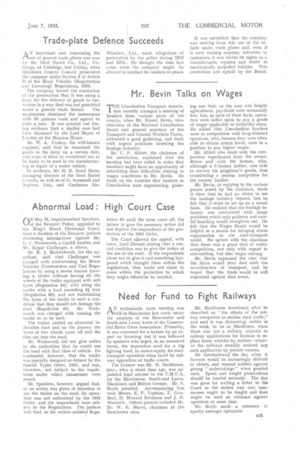Mr. Bevin Talks on Wages T HE Lincolnshire Transport Association recently
Page 35

If you've noticed an error in this article please click here to report it so we can fix it.
arranged a meeting of hauliers from various parts of the county, when Mr. Ernest Bevin, vicechairman of the National Conciliation Board and general secretary of the Transport and General Workers Union, addressed a good gathering, and dealt with urgent problems besetting the haulage industry.
Mr. C. P. Ablest, the chairman of the association, explained that the meeting had been called in order that members might have an opportunity of submitting their difficulties relating to wages conditions to Mr. Bevin. He dwelt on the troubles that hauliers in Lincolnshire were experiencing, point Mg out that, as the area was largely agricultural, pay-loads were necessarily low, but, in spite of these facts, operators were called upon to pay a grade of wages applicable to industrial areas. He added that Lincolnshire hauliers were in competition with long-distance operators, who, because they were often able to obtain return loads, were in a, position to pay higher wages. • Mr. Ablett also dealt with the competition experienced from the ownerdriver and with the farmer, who, although a C-licence holder, was able to convey his neighbour's goods, thus constituting a serious competitor for the county haulier.
Mr. Bevin, in replying to the various points raised by the chairman, made it clear that he had no desire to see the haulage industry injured, but he felt that it must be set up on a sound basis. He realized that the haulage industry was confronted with many problems which only patience and careful handling would straighten out. He felt that the Wages Board would be helpful as a means for bringing about organization in the road-transport world. He agreed with the chairman that there was a great deal of unfair competition, not only with regard to rate-cutting, but also wages cutting.
Mr. 13evin expressed the view that the State would next deal with the co-ordination of transport, and he hoped that the trade would be well organized against that event.




























































































